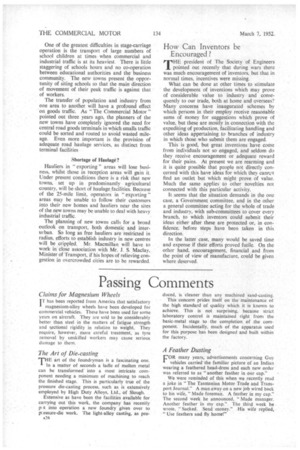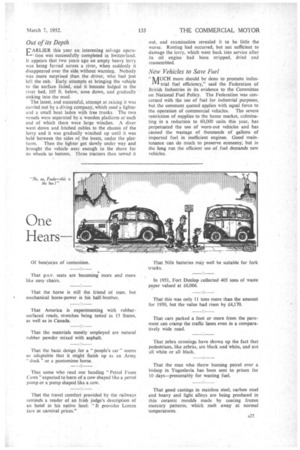Passing Comments
Page 28

Page 29

If you've noticed an error in this article please click here to report it so we can fix it.
Claims for Magnesium Wheels
TT has been reported from America that satisfactory I magnesium-alloy wheels have been developed for commercial vehicles. These have been used for some. years on aircraft. They are said to be considerably better than steel in the matters of fatigue strength and sectional rigidity in relation to weight. They require, however, more careful treatment, as tyre removal by unskilled workers may cause serious damage to them.
The Art of Die-casting .
THE art of the foundryman is a fascinating one. In a matter of seconds a ladle of molten metal can be transformedinto a most intricate corriponent needing a minimum of machining to reach the finished stage. This is particularly true of the pressure die-casting process, such as is extensively employed by High Duty Alloys, Ltd., of Slough. . Extensive as have been the facilities available for carrying out this work, the company has recently into operation a new foundry given over to p.essure-die work. The light-alloy casting, as proA26
duced, is cleaner than any machined sand-casting.
This concern prides itself on the maintenance ot the high standard of quality which it is known to achieve. This is not surprising, because strict laboratory control is maintained right from the basic-metal stage to the completion of the component. Incidentally, much of the apparatus used for this purpose has been designed and built within the factory.
A Feather Dusting
FOR many years, advertisements concerning Guy vehicles carried the familiar picture of an Indian wearing a feathered head-dress and each new order was referred to as "another feather in our cap."
We were reminded of this when we recently read a joke in "The Tasmanian Motor Trade and Transport Journal." A man away on a new job wired back to his wife, "Made foreman. A feather in my cap." The second week he announced, "Made manager. Another feather in my cap." The third week he wrote, "Sacked. Send money." His wife replied, " Use feathers and fly homer
Out of its Depth
ARLIER this year an interesting salvage opera", tion was successfully completed in Switzerland. It appears that two years ago an empty heavy lorry was being ferried across a river, when suddenly it disappeared over the side without warning. Nobody was more surprised than the driver, who had just left the cab. Early attempts at bringing the vehicle to the surface failed, and it became lodged in the river bed, 105 ft. below, nose down, and gradually sinking into the mud.
The latest, and successful, attempt at raising it was carried out by a diving company, which used a lighter and a small boat laden with tree trunks. The two vessels were separated by a wooden platform aFeach end of which there were large winches. A diver went down and hitched cables to the chassis of the lorry and it was gradually winched up until it was held between the sides of the boats, under the platform. Then the lighter got slowly under way and brought the vehicle near enough to the shore for its wheels to bottom. Three tractors then towed it out, and examination revealed it to be little the worse. Rusting had occurred, but not sufficient to damage the lorry, which went back into service after its oil engine had been stripped, dried and reassembled.
New Vehicles to Save Fuel
"MUCH more should be done to promote indus
" I trial fuel efficiency," said the Federation of British Industries in its evidence to the Committee on National Fuel Policy. The Federation was concerned with the use of fuel for industrial purposes, but the comment quoted applies with equal force to the operation of commercial vehicles. The severe restriction of supplies to the home market, culminating in a reduction to 60,000 units this year, has perpetuated the use of worn-out vehicles and has caused the wastage of thousands of gallons of imported fuel in inefficient engines. Good maintenance can do much to preserve economy; but in the long run the efficient use of fuel demands new vehicles.




























































































